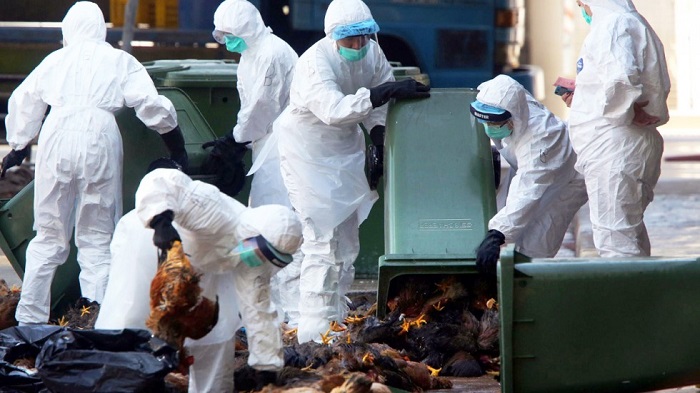
Bird flu forces cull of 22 million poultry
South Korean authorities have culled more than 22.5 million poultry this winter, according to an official, as part of intense efforts to contain its worst bird flu epidemic in recent history that has affected farms across the country.
The total number slaughtered since November 18 accounts for about 15 percent of the country's poultry stock. The first outbreak was reported at a chicken farm in Haenam, about 420km south of the capital Seoul.
Authorities also plan to kill an additional 2.97 million chickens and ducks across the country in coming days, the country's Yonhap News Agency reported on Saturday.
"Korea has suffered from several bird flu outbreaks since 2003. I can tell you this year is the worst year ever," said Oh Se-ul, chairman of the Korea Poultry Association.
The outbreak - the first in nearly seven months - has been caused by the highly pathogenic H5N6 strain of bird flu, a new type of virus that was first detected in South Korea.
Previous cases
In 2014 South Korea had culled 14 million birds amid a bird flu outbreak. As of the end of March this year, the country had killed more than 156 million chickens and more than 9.5 million ducks, according to government data.
Because most of the birds culled since last month are egg-laying hens, the consequential shortage in eggs has caused their prices to rise sharply.
In South Korea, the average retail price for 30 eggs has risen nearly 25 percent to $5.68 since November 18 - the highest in more than three years, according to state-run Korea Agro-Fisheries & Food Trade Corp.
According to data from the institution, it is the highest month-on-month increase in egg prices in nearly a decade.
Besides the price increases, some stores are restricting egg purchases.
To ease the shortage, South Korea's agriculture ministry is seeking to import egg-laying chickens and eggs from the US, Spain and New Zealand.
Analysts say the egg shortage is expected to last at least one year as it could take up to two years for egg and poultry industry to raise baby chickens and rebuild flocks.
Yoon Se-young, a farmer in Seoul, says he is worried because the government has not yet announced any plans to compensate farmers who had to cull their poultry.
"It has been a month since I had to kill all my chickens and bury them," he said. "However, I have not heard of any clear explanation on how the government will compensate for my loss."
Jeong In-hwa, a member of South Korea's Parliamentary Agriculture Committee, says that with the issue of President Park Geun-hye's impeachment taking the spotlight, the media has failed to highlight the bird flu epidemic.
“As the impeachment becomes the most important national issue, protesters at candlelight rallies are dominating the headlines," he said. "Because of that, the avian flu isn't getting much attention."
Japan and China
Japan and China have also taken serious measures to control the bird flu outbreak that spread across northeast Asia.
Japan launched a new chicken cull on a southern island, days after gassing hundreds of thousands of birds about 2,400km to the north.
Tackling Japan's sixth outbreak since end-November, Kyushu authorities said they will gas just over 120,000 chickens after the H5 virus was detected on a farm.
The outbreak in Japan's Miyazaki prefecture follows the gassing of more than 200,000 chickens at a farm in the northern island of Hokkaido last weekend and brings the country's cull this season to nearly a million chickens and ducks.
The cases in Japan - outbreaks before Miyazaki were all confirmed as H5N6 bird flu - are the first in nearly two years, with the bird cull now standing at its highest in six years.
In China, chickens are being fed more vitamins and vaccines while farmers also ramp up henhouse sterilisation in an effort to protect their flocks.
As part of its protection drive, China now has bans in place on poultry imports from more than 60 countries, including South Korea and Japan as well as parts of Europe now also experiencing a bird flu outbreak.
The last major outbreak in mainland China in 2013 killed 36 people and caused about $6.5bn in losses to the agriculture sector.
According to the website of China's agriculture ministry, delegations from Japan, South Korea and China gathered in Beijing last week for a symposium on preventing and controlling bird flu and other diseases in East Asia.
